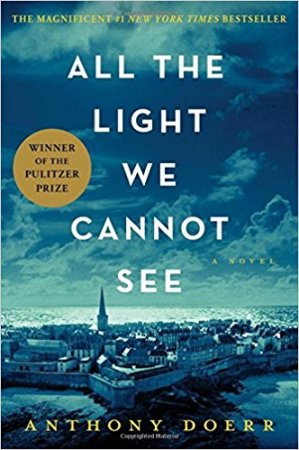- Home
- Anthony Doerr
All the Light We Cannot See Page 26
All the Light We Cannot See Read online
Page 26
“I hope so. I hope we are.”
Rue des Patriarches
Von Rumpel enters an apartment house in the 5th arrondissement. The simpering landlady on the first floor takes the sheaf of ration tickets he offers and buries them in her housecoat. Cats swarm her ankles. Behind her, an overdecorated flat reeks of dead apple blossoms, confusion, old age.
“When did they leave, Madame?”
“Summer of 1940.” She looks as if she might hiss.
“Who pays the rent?”
“I don’t know, Monsieur.”
“Do the checks come from the Natural History Museum?”
“I can’t say.”
“When was the last time someone came?”
“No one comes. The checks are mailed.”
“From where?”
“I don’t know.”
“And no one leaves or enters the flat?”
“Not since that summer,” she says, and retreats with her vulture face and vulture fingernails into the redolent dark.
Up he goes. A single dead bolt on the fourth floor marks the locksmith’s flat. Inside, the windows are boarded over with wood veneer, and an airless, pearly light seeps through the knotholes. As though he has climbed into a dark box hung inside a column of pure light. Cabinets hang open, sofa cushions sit slightly cockeyed, a kitchen chair is toppled on its side. Everything speaks of a hasty departure or a rigorous search or both. A black rim of algae rings the toilet bowl where the water has slipped away. He inspects the bedroom, bathroom, kitchen, some fiendish and immitigable hope flaring within him: What if—?
Along the top of a workbench stand tiny benches, tiny lampposts, tiny trapezoids of polished wood. Little vise, little box of nails, little bottles of glue long since hardened. Beside the bench, beneath a dropcloth, a surprise: a complicated model of the 5th arrondissement. The buildings are unpainted but otherwise beautifully detailed. Shutters, doors, windows, storm drains. No people. A toy?
In the closet hang a few moth-eaten girl’s dresses and a sweater on which embroidered goats chew flowers. Dusty pinecones line the windowsill, arranged large to small. On the floor of the kitchen, friction strips have been nailed into the wood. A place of quiet discipline. Calm. Order. A single line of twine runs between the table and the bathroom. A clock stands dead without glass on its face. It’s not until he finds three huge spiral-bound folios of Jules Verne in Braille that he solves it.
A safe maker. Brilliant with locks. Lives within walking distance of the museum. Employed there all his adult life. Humble, no visible aspirations for wealth. A blind daughter. Plenty of reasons to be loyal.
“Where are you hiding?” he says aloud to the room. The dust swirls in the strange light.
Inside a bag or a box. Tucked behind a baseboard or stashed in a compartment beneath the floorboards or plastered up inside a wall. He opens the kitchen drawers and checks behind them. But the previous searchers would have checked all of this.
Slowly his attention returns to the scale model of the neighborhood. Hundreds of tiny houses with mansard roofs and balconies. It is this exact neighborhood, he realizes, colorless and depopulated and miniaturized. A tiny spectral version of it. One building in particular appears smoothed and worn by the insistence of fingers: the building he’s in. Home.
He puts his eye to street level, becomes a god looming over the Latin Quarter. With two fingers, he could pinch out anyone he chooses, nudge half a city into shadow. Flip it upside down. He sets his fingers atop the roof of the apartment house in which he kneels. Wiggles it back and forth. It lifts free of the model easily, as though designed to do so. He rotates it in front of his eyes: eighteen little windows, six balconies, a tiny entrance door. Down here—behind this window—lurks the little landlady with her cats. And here, on the fourth floor, himself.
On its bottom he finds a tiny hole, not at all unlike the keyhole in the jewel safe in the museum he saw three years before. The house is, he realizes, a container. A receptacle. He plays with it awhile, trying to solve it. Turns it over, tries the bottom, the side.
His heart rate soars. Something wet and feverish rises onto his tongue.
Do you have something inside of you?
Von Rumpel sets the little house on the floor, raises his foot, and crushes it.
White City
In April 1944 the Opel rattles into a white city full of empty windows. “Vienna,” says Volkheimer, and Neumann Two fulminates about Hapsburg palaces and Wiener schnitzel and girls whose vulvas taste like apple strudel. They sleep in a once stately Old World suite with the furniture shored up against the walls and chicken feathers clogging the marble sinks and newspapers tacked clumsily across the windows. Down below, a switching yard presents a wilderness of train tracks. Werner thinks of Dr. Hauptmann with his curls and fur-lined gloves, whose Viennese youth Werner imagined spent in vibrant cafés where scientists-to-be discussed Bohr and Schopenhauer, where marble statues stared down from ledges like kindly godparents.
Hauptmann, who, presumably, is still in Berlin. Or at the front, like everyone else.
The city commander has no time for them. A subordinate tells Volkheimer there are reports of resistance broadcasts washing out of the Leopoldstadt. Round and round the district they drive. Cold fog hangs in the budding trees, and Werner sits in the back of the truck and shivers. The place smells to him of carnage.
For five days he hears nothing on his transceiver but anthems and recorded propaganda and broadcasts from beleaguered colonels requesting supplies, gasoline, men. It is all unraveling, Werner can feel it; the fabric of the war tearing apart.
“That’s the Staatsoper,” says Neumann Two one night. The facade of a grand building rises gracefully, pilastered and crenelated. Stately wings soar on either side, somehow both heavy and light. It strikes Werner just then as wondrously futile to build splendid buildings, to make music, to sing songs, to print huge books full of colorful birds in the face of the seismic, engulfing indifference of the world—what pretensions humans have! Why bother to make music when the silence and wind are so much larger? Why light lamps when the darkness will inevitably snuff them? When Russian prisoners are chained by threes and fours to fences while German privates tuck live grenades in their pockets and run?
Opera houses! Cities on the moon! Ridiculous. They would all do better to put their faces on the curbs and wait for the boys who come through the city dragging sledges stacked with corpses.
At midmorning Volkheimer orders them to park in the Augarten. The sun burns away the fog and reveals the first blooms on the trees. Werner can feel the fever flickering inside him, a stove with its door latched. Neumann One, who, if he were not scheduled to die ten weeks from now in the Allied invasion of Normandy, might have become a barber later in life, who would have smelled of talc and whiskey and put his index finger into men’s ears to position their heads, whose pants and shirts always would have been covered with clipped hairs, who, in his shop, would have taped postcards of the Alps around the circumference of a big cheap wavery mirror, who would have been faithful to his stout wife for the rest of his life—Neumann One says, “Time for haircuts.”
He sets a stool on the sidewalk and throws a mostly clean towel over Bernd’s shoulders and snips away. Werner finds a state-sponsored station playing waltzes and sets the speaker in the open back door of the Opel so all can hear. Neumann One cuts Bernd’s hair, then Werner’s, then pouchy, wrecked Neumann Two’s. Werner watches Volkheimer climb onto the stool and close his eyes when a particularly plangent waltz comes on, Volkheimer who has killed a hundred men by now at least, probably more, walking into pathetic radio-transmitting shacks in his huge expropriated boots, sneaking up behind some emaciated Ukrainian with headphones on his ears and a microphone at his lips and shooting him in the back of the head, then going to the truck to tell Werner to collect the transmitter, making the order calmly, sleepily, even with the pieces of the man on the transmitter like that.
Volkheimer who always makes sur
e there is food for Werner. Who brings him eggs, who shares his broth, whose fondness for Werner remains, it seems, unshakable.
The Augarten proves a thorny place to search, full of narrow streets and tall apartment houses. Transmissions both pass through the buildings and reflect off them. That afternoon, long after the stool has been put away and the waltzes have stopped, while Werner sits with his transceiver listening to nothing, a little redheaded girl in a maroon cape emerges from a doorway, maybe six or seven years old, small for her age, with big clear eyes that remind him of Jutta’s. She runs across the street to the park and plays there alone, beneath the budding trees, while her mother stands on the corner and bites the tips of her fingers. The girl climbs into the swing and pendulums back and forth, pumping her legs, and watching her opens some valve in Werner’s soul. This is life, he thinks, this is why we live, to play like this on a day when winter is finally releasing its grip. He waits for Neumann Two to come around the truck and say something crass, to spoil it, but he doesn’t, and neither does Bernd, maybe they don’t see her at all, maybe this one pure thing will escape their defilement, and the girl sings as she swings, a high song that Werner recognizes, a counting song that girls jumping rope in the alley behind Children’s House used to sing, Eins, zwei, Polizei, drei, vier, Offizier, and how he would like to join her, push her higher and higher, sing fünf, sechs, alte Hex, sieben, acht, gute Nacht! Then her mother calls something Werner cannot hear and takes the girl’s hand. They pass around a corner, little velvet cape trailing behind, and are gone.
Not an hour later, he snares something winging in out of the static: a simple broadcast in Swiss German. Hit nine, transmitting at 1600, this is KX46, do you receive? He does not understand all of it. Then it goes. Werner crosses the square and tunes the second transceiver himself. When they speak again, he triangulates and plugs the numbers into the equation, then looks up and sees with his naked eyes what looks very much like a wire antenna trailing down the side of an apartment house flanking the square.
So easy.
Already Volkheimer’s eyes have come alive, a lion who has caught the scent. As though he and Werner hardly need to speak to communicate.
“See the wire trailing down there?” Werner asks.
Voklheimer glasses the building with binoculars. “That window?”
“Yes.”
“It’s not too dense in here? All these flats?”
“That’s the window,” says Werner.
They go in. He does not hear any shots. Five minutes later, they call him up into a fifth-floor flat wallpapered with a dizzying floral print. He expects to be asked to look over the equipment, as usual, but there is none: no corpses, no transmitter, not even a simple listening set. Just ornate lamps and an embroidered sofa and the swarming rococo wallpaper.
“Pry up the floorboards,” orders Volkheimer, but after Neumann Two pries up several and peers down, it’s clear that the only thing under the boards is decades-old horsehair for insulation.
“Another flat, maybe? Another floor?”
Werner crosses into a bedroom and slides open the window and peers over an iron balcony. What he thought was an antenna is nothing more than a painted rod run up the side of a pilaster, probably meant to anchor a clothesline. Not an antenna at all. But he heard a transmission. Didn’t he?
An ache reaches up through the base of his skull. He laces his hands behind his head and sits on the edge of an unmade bed and looks at the clothes here—a slip folded over the back of a chair, a pewter-backed hairbrush on the bureau, rows of tiny frosted bottles and pots on a vanity, all of it inarticulably feminine to him, mysterious and confusing, in the way Herr Siedler’s wife confused him four years before as she hitched up her skirt and knelt in front of her big radio.
A woman’s room. Wrinkled sheets, a smell like skin lotion in the air, and a photograph of a young man—nephew? lover? brother?—on a dressing table. Maybe his math was wrong. Maybe the signal scattered off the buildings. Maybe the fever has scrambled his wits. On the wallpaper in front of him, roses appear to drift, rotate, swap places.
“Nothing?” calls Volkheimer from the other room, and Bernd calls back, “Nothing.”
In some alternate universe, Werner considers, this woman and Frau Elena could have been friends. A reality more pleasant than this one. Then he sees, hung on the doorknob, a maroon square of velvet, hood attached, a child’s cape, and at exactly that moment in the other bedroom, Neumann Two makes a cry like a high, surprised gargle and there is a single shot, then a woman’s scream, then more shots, and Volkheimer strides past, hurrying, and the rest follow, and they find Neumann Two standing in front of a closet with both hands on his rifle and the smell of gunpowder all around. On the floor is a woman, one arm swept backward as if she has been refused a dance, and inside the closet is not a radio but a child sitting on her bottom with a bullet through her head. Her moon eyes are open and moist and her mouth is stretched back in an oval of surprise and it is the girl from the swings and she cannot be over seven years old.
Werner waits for the child to blink. Blink, he thinks, blink blink blink. Already Volkheimer is closing the closet door, though it won’t close all the way because the girl’s foot is sticking out of it, and Bernd is covering the woman on the bed with a blanket, and how could Neumann Two not have known, but of course he didn’t, because that is how things are with Neumann Two, with everybody in this unit, in this army, in this world, they do as they’re told, they get scared, they move about with only themselves in mind. Name me someone who does not.
Neumann One shoulders out, something rancid in his eyes. Neumann Two stands there with his new haircut, his fingers playing senseless trills on the stock of his rifle. “Why did they hide?” he says.
Volkheimer tucks the child’s foot gently back inside the closet. “There’s no radio here,” he says, and shuts the door. Threads of nausea reach up around Werner’s windpipe.
Outside, the streetlamps shudder in a late wind. Clouds ride west over the city.
Werner climbs into the Opel, feeling as if the buildings are rearing around him, growing taller and warping. He sits with his forehead against the listening decks and is sick between his shoes.
So really, children, mathematically, all of light is invisible.
Bernd climbs in and pulls the door shut and the Opel comes to life, tilting as it rounds a corner, and Werner can feel the streets rising around them, whorling slowly into an engulfing spiral, into the center of which the truck will arc downward, tracing deeper and deeper all the time.
Twenty Thousand Leagues Under the Sea
On the floor outside Marie-Laure’s bedroom door waits something big wrapped in newsprint and twine. From the stairwell, Etienne says, “Happy sixteenth birthday.”
She tears away the paper. Two books, one stacked atop the other.
Three years and four months have passed since Papa left Saint-Malo. One thousand two hundred and twenty-four days. Almost four years have passed since she has felt Braille, and yet the letters rise from her memory as if she left off reading yesterday.
Jules. Verne. Twenty. Thousand. Leagues. Part. One. Part. Two.
She throws herself at her great-uncle and hangs her arms around his neck.
“You said you never got to finish. I thought, rather than my reading it to you, maybe you could read it to me?”
“But how—?”
“Monsieur Hébrard, the bookseller.”
“When nothing is available? And they’re so expensive—”
“You have made a lot of friends in this town, Marie-Laure.”
She stretches out on the floor and opens to the first page. “I’m going to start it all over again. From the beginning.”
“Perfect.”
“ ‘Chapter One,’ ” she reads. “ ‘A Shifting Reef.’ ” The year 1866 was marked by a strange event, an unexplainable occurrence, which is undoubtedly still fresh in everyone’s memory . . . She gallops through the first ten pages, the s
tory coming back: worldwide curiosity about what must be a mythical sea monster, famed marine biologist Professor Pierre Aronnax setting off to discover the truth. Is it monster or moving reef? Something else? Any page now, Aronnax will plunge over the rail of the frigate; not long afterward, he and the Canadian harpooner Ned Land will find themselves on Captain Nemo’s submarine.
Beyond the carton-covered window, rain sifts down from a platinum-colored sky. A dove scrabbles along the gutter calling hoo hoo hoo. Out in the harbor a sturgeon makes a single leap like a silver horse and then is gone.
Telegram
A new garrison commander has arrived on the Emerald Coast, a colonel. Trim, smart, efficient. Won medals at Stalingrad. Wears a monocle. Invariably accompanied by a gorgeous French secretary-interpreter who may or may not have consorted with Russian royalty.
He is average-sized and prematurely gray, but by some contrivance of carriage and posture, he makes the men who stand before him feel smaller. The rumor is that this colonel ran an entire automobile company before the war. That he is a man who understands the power of the German soil, who feels its dark prehistoric vigor thudding in his very cells. That he will never acquiesce.
Every night he sends telegrams from the district office in Saint-Malo. Among the sixteen official communiqués sent on the thirtieth of April, 1944, is a missive to Berlin.
= NOTICE OF TERRORIST BROADCASTS IN CÔTES D’ARMOR WE BELIEVE SAINT-LUNAIRE OR DINARD OR SAINT-MALO OR CANCALE = REQUEST ASSISTANCE TO LOCATE AND ELIMINATE
Dot dot dash dash, off it goes into the wires belted across Europe.
Eight
* * *
9 August 1944
Fort National
On the third afternoon of the siege of Saint-Malo, the shelling lulls, as though all the artillerymen abruptly fell asleep at their guns. Trees burn, cars burn, houses burn. German soldiers drink wine in blockhouses. A priest in the college cellar scatters holy water on the walls. Two horses, gone mad with fear, kick through the door of the garage in which they’ve been shut and gallop between the smoldering houses on the Grand Rue.
Around four o’clock, an American field howitzer, two miles away, lets fly a single improperly ranged shell. It sails over the city walls and bursts against the northern parapet of Fort National, where three hundred and eighty Frenchmen are being held against their will with minimal cover. Nine are killed instantly. One of them still clutching the hand of bridge he was playing when the shell struck.
In the Attic
For all of Marie-Laure’s four years in Saint-Malo, the bells at St. Vincent’s have marked the hours. But now the bells have ceased. She does not know how long she has been trapped in the attic or even if it is day or night. Time is a slippery thing: lose hold of it once, and its string might sail out of your hands forever.
Her thirst becomes so acute, she considers biting into her own arm to drink the liquid that courses there. She takes the cans of food from her great-uncle’s coat and sets her lips on their rims. Both taste of tin. Their contents just a millimeter away.
Don’t risk it, says the voice of her father. Don’t risk the noise.
Just one, Papa. I will save the other. The German is gone. Almost certainly he is gone by now.
Why hasn’t the trip wire sprung?
Because he cut the wire. Or I slept through the bell. Any of a half dozen other reasons.
Why would he leave when what he seeks is here?
Who knows what he seeks?
You know what he seeks.
I am so hungry, Papa.
Try to think about something else.
Roaring falls of clear, cool water.

 All the Light We Cannot See
All the Light We Cannot See About Grace
About Grace Four Seasons in Rome: On Twins, Insomnia, and the Biggest Funeral in the History of the World
Four Seasons in Rome: On Twins, Insomnia, and the Biggest Funeral in the History of the World Memory Wall
Memory Wall The Best American Short Stories 2019
The Best American Short Stories 2019 Four Seasons in Rome
Four Seasons in Rome The Shell Collector
The Shell Collector All the Light We Cannot See: A Novel
All the Light We Cannot See: A Novel Memory Wall: Stories
Memory Wall: Stories Shell Collector
Shell Collector